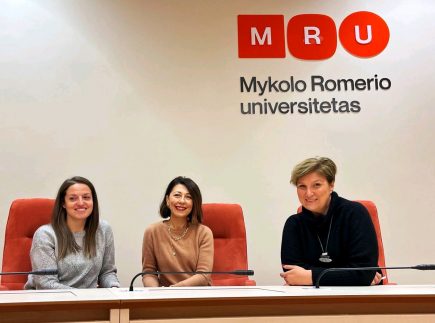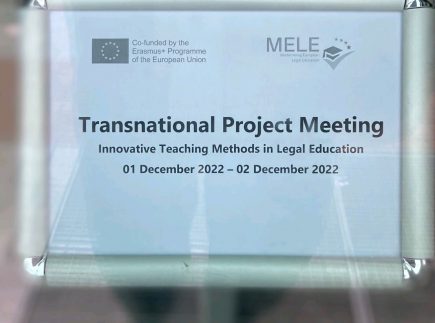
December 1st - 2nd, 2022, a Transnational Project Meeting on “Innovative Teaching Methods in Legal Education” bringing together representatives from 7 different universities working in the area of Law, was held at Mykolas Romeris University (MRU).
The Meeting is part of the Modernising European Legal Education (MELE) project.
MRU’s Law School presented its activities relating to improvement of studies during the last several years, as well as experiential teaching, mentoring, free legal aid, partnership integration, technological aspects. The most important achievements in these areas were discussed as well as initiatives currently being implemented.
All over the world legal specialists confront quite a few changes due to ever changing activity conditions, noted MRU Law School Dean Prof. Lyra Jakulevičienė. These conditions influence the need to adapt law studies and the preparation of legal specialists seeking that the new specialists would be able to work in an ever-changing digitalised world, where it is not enough to have legal knowledge. It is also important to have “soft” abilities and perhaps a different type of thinking, Law School Dean Prof. Jakulevičienė.
During the event MRU LegalTech Centre Head Prof. Paulius Pakutinskas discussed legal technologies, the use of artificial intelligence and integrating into law studies programmes and studies’ courses. Assoc. Prof. Marius Laurinaitis acquainted participants with the new certification programme aimed at preparing specialists in money laundering and terrorism financing prevention. Law School Assoc. Prof. Juozas Valčiukas shared his practice of integrating experiential learning in law studies. Nastė Grubliauskienė presented achievements in the mentoring programme.
Project partners, inspired by MRU Law School’s initiatives, discussed innovative teaching methods and their application in law studies, discussed implemented project activities (preparation of a tool for lecturers, e-Course for students), advertising, possible new projects and further cooperation.
The goal of the MELE project is to strengthen transversal competences and academic skills, improving the teaching competencies of academic personnel. In addition, it seeks to expand student knowledge with cross-cutting topics such as gender equality, European Green Deal and climate change, digitalisation and multi-level management.
Project partners: Germany’s Saarland University (coordinator), Serbia’s University of Belgrade, Croatia’s Zagreb University, North Macedonia’s University of Skopje, Spain’s Cadiz University, Netherlands University of Groningen, Regent’s University London (United Kingdom), and the South Eastern European Law School Network (uniting 10 Balkan region universities).
The project is co-funded by the Erasmus+ Programme of the European Union. The project is being implemented 2020-2023.

